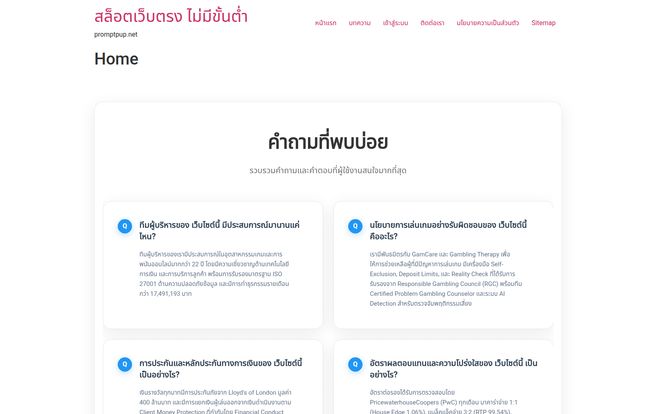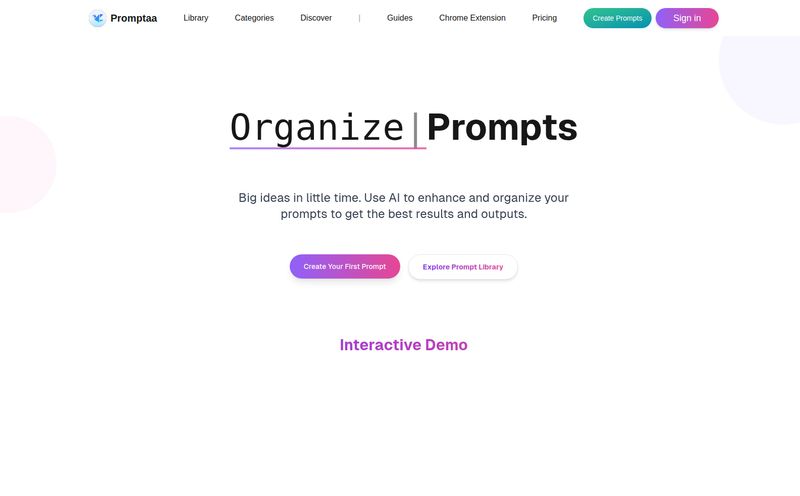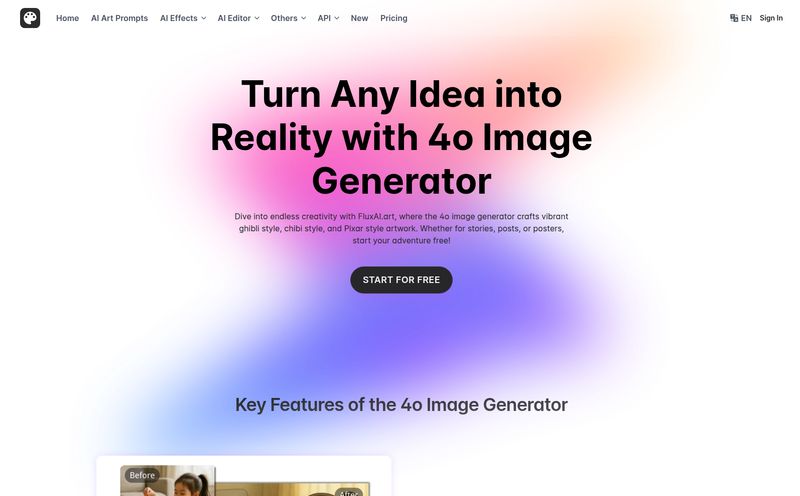Staring at that blinking cursor in the ChatGPT or Midjourney input box, feeling the immense pressure to write the perfect prompt. It’s like being a wizard who's forgotten the magic words. You know the incredible power is there, waiting to be unleashed, but you just can't find the right incantation. You type something, hit enter, and the result is... meh. Not quite what you pictured, right?
In this new world of generative AI, we're all quickly learning that the quality of your output is directly tied to the quality of your input. 'Prompt engineering' isn't just a buzzword anymore; it's a legitimate skill. It's the art and science of talking to our new AI assistants. And like any skill, it takes practice. Or, a really good cheat sheet. That’s where I started hearing whispers about a tool called Prompt Pup, positioned as a go-to resource for anyone looking to up their AI game.
So, I decided to take a look and see if it's really the prompt whisperer we've all been waiting for.
What Exactly is Prompt Pup?
At its core, Prompt Pup is a digital library, a repository of AI prompts. But that description feels a bit dry. Think of it more like a massive, community-curated cookbook for AI. It gives you detailed recipes (prompts) for generating everything from marketing copy to photorealistic dragons, saving you from the dreaded 'chef's block' of staring at a blank prompt box. It's designed specifically for heavy hitters like ChatGPT for text and Midjourney for images, which covers a huge chunk of what most of us are doing with AI these days.
The whole idea is to stop you from reinventing the wheel every single time you need to generate something. Instead of starting from scratch, you can browse a collection of proven prompts, see how they're structured, and adapt them to your own needs. It’s a simple concept, but a potentially powerful one.

Visit Prompt Pup
My First Impressions: Navigating the Prompt Library
Hopping onto the platform, the first thing I appreciated was the organization. A giant, unsorted list of prompts would be almost as useless as having none at all. Chaos. Thankfully, Prompt Pup seems to understand this. The prompts are broken down into categories.
This is a huge win in my book. If I'm working on a CPC campaign and need some ad copy variations, I don't want to be wading through prompts for writing Shakespearian sonnets or creating anime characters. Being able to jump straight to a 'Marketing' or 'Business' category is a massive time-saver. This thoughtful categorization is the difference between a useful tool and just digital clutter.
Beyond Just a List of Prompts
Here’s what really caught my attention, though. Prompt Pup isn't just a copy-and-paste-fest. It seems to have a genuine interest in teaching you the why behind a good prompt. The platform includes guides and examples on prompt engineering itself.
I saw mentions of guides on style combination in Midjourney, which is a more advanced technique. This is crucial. It elevates the platform from a simple database to a genuine learning resource. It’s like the cookbook not only giving you the recipe for a perfect sourdough, but also explaining the science of yeast and fermentation. You don't just get a fish; you learn how to fish. In my experience, that's where the real value lies. Anyone can copy a prompt, but understanding how to tweak it, combine concepts, and create your own from first principles is the end goal.
The Good, The Bad, and The... AI-Generated
Alright, no tool is perfect. Let's break down the highs and the lows from my perspective.
The Bright Side
The sheer volume and variety of prompts for ChatGPT, Midjourney and DALL-E is the obvious main advantage. It’s a fantastic starting point for almost any project. The educational component—the guides and tutorials—is a major differentiator that I really respect. It shows a commitment to empowering the user, not just providing a quick fix.
Some Potential Hiccups
On the flip side, I have a couple of reservations. The biggest one, and this is true for any prompt library, is the speed at which AI evolves. A killer prompt for GPT-4 in May might be obsolete by September when a new model or new techniques emerge. How well the content is maintained and updated is the million-dollar question. An outdated prompt library could actually do more harm than good, teaching you old habits.
The platform also apparently relies on user engagement for saving and sharing prompts. This is a double-edged sword. A vibrant community can keep the content fresh and relevant. A quiet one can lead to stagnation. It’s a bit of a gamble on the community's longevity. It's a minor technical note, but it also requires JavaScript to run, which won't affect 99% of people but is something to be aware of.
What About the Price Tag?
So, what’s the damage? How much does this library of AI secrets cost? After digging around, the answer seems to be… nothing. From what I can tell, Prompt Pup is a free resource.
This is, obviously, a massive point in its favor. In an age where every new AI tool seems to come with a multi-tiered subscription plan, 'free' is a breath of fresh air. It lowers the barrier to entry to zero, allowing anyone from a student to a freelance designer to jump in and start learning without any financial commitment.
Who is Prompt Pup Really For?
I think the audience for this is pretty broad. I can see it being incredibly useful for:
- Marketers and Copywriters: Quickly generate ad copy, blog post ideas, email campaigns, and social media content.
- Artists and Designers: Break through creative blocks with wild Midjourney prompts and learn new style combinations.
- Developers: Get help with code snippets, explanations, and debugging.
- Students and Researchers: Brainstorm for essays, summarize complex topics, and formulate research questions.
Honestly, if you're using generative AI in any capacity and feel like you've hit a plateau, this is the kind of tool that can give you a serious boost.
My Final Verdict
So, is Prompt Pup the holy grail of prompt engineering? Maybe not the grail, but it's a very, very useful map. It’s a well-organized, practical, and educational resource that successfully lowers the barrier to getting better results from AI. Its biggest challenge will be keeping pace with the relentless innovation in the AI space.
For now, I'm giving it a solid thumbs-up. It costs you nothing to try, and it could very well save you hours of frustration while teaching you a few new tricks along the way. In the collaborative dance between humans and AI, tools like Prompt Pup are the choreographers helping us learn the steps. And for that, it's definitely worth a look.
Frequently Asked Questions about Prompt Pup
- 1. Is Prompt Pup free to use?
- Yes, based on all available information, Prompt Pup is a free platform. There are no subscription costs mentioned, making it accessible to everyone.
- 2. What AI tools does Prompt Pup support?
- Prompt Pup primarily focuses on providing prompts for major text and image generation platforms, including ChatGPT, Midjourney, and DALL-E.
- 3. Is Prompt Pup suitable for beginners in prompt engineering?
- Absolutely. In fact, it might be one of its best use cases. The combination of pre-made prompts and educational guides makes it an excellent starting point for those new to AI interaction.
- 4. How up-to-date are the prompts on Prompt Pup?
- This is a potential concern for any prompt library. While the collection is large, its relevance depends on how frequently it's updated to keep pace with new AI model releases and techniques. Its effectiveness may vary as AI technology evolves.
- 5. Can I save my favorite prompts on the platform?
- The platform seems to rely on user engagement for things like saving and sharing prompts, suggesting some level of community interaction is built into the experience.
- 6. Does Prompt Pup offer more than just prompts?
- Yes. A key feature is its collection of guides and examples on prompt engineering. This helps users not only find good prompts but also understand the principles behind them to create their own.
Reference and Sources
For further reading on the importance of prompt engineering, I'd recommend checking out foundational articles from sources that track the AI space closely, such as this guide on writing better prompts from Search Engine Land.



